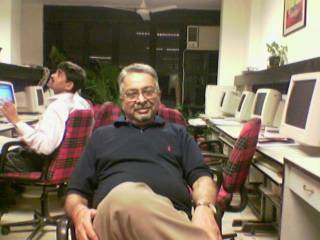
Last September, Saudi Arabia cocked a snook at US Fed when it slashed its interest by 50 bps.
This time, when Fed further slashed by 25 bps, Saudi fell in line.
See Financial Times reportage below:
Gulf move quells dollar-peg talk
By Simeon Kerr in Dubai and Roula Khalaf in London
Published: November 2 2007 02:43
Gulf states on Thursday cut some interest rates in a move that generally tracked the US Federal Reserve’s 25 basis points cut, undermining speculation that these oil-exporting economies may drop their dollar pegs.
Saudi Arabia, the largest economy in the region, reduced one of its interest rates by 25 basis points while raising banks’ reserve requirements to limit the growth of monetary supply in a bid to tame rising inflation. Five of the six Gulf Co-operation Council members peg their currencies to the US dollar and therefore usually follow US interest rate decisions. Kuwait in May abandoned its dollar peg, citing rising levels of inflation imported by the weakening dollar.
The economic boom in the oil-rich Gulf, where oil prices have quadrupled during the past five years, should dictate higher interest rates, rather than the looser monetary policy being dished out to a US economy struggling to come to terms with the summer’s subprime mortgage crisis. “Increasing the Saudi reserve requirements is a way of tightening the monetary environment without raising rates,” said Simon Williams, an economist with HSBC in Dubai.
Speaking to reporters in London, Prince Saud al-Faisal, foreign minister, quelled speculation of any Saudi intention to drop the dollar peg. “Why would one do that?” he said, adding only half-jokingly that there “aren’t enough euros” around.
In September, Saudi Arabia ignored the Federal Reserve’s 50 basis-point cut, triggering speculative flows into the riyal that wrongly bet on a Saudi revaluation.
Saudi Arabia on Thursday also gave plans for a single Gulf currency a much-needed boost, predicting the majority of states in the Gulf Co-operation Council, including Riyadh, would join by the agreed date of 2010.
“Perhaps not collectively, but the majority will achieve it,” Prince Saud said, referring to the single currency.
The foreign minister’s comments come ahead of next month’s GCC heads of state meeting in Qatar that will provide some measure of progress towards the troubled single currency project, even though a final decision on the planned deadline has been pushed back until next year. Oman has publicly opted out, saying it will not be able to harmonise its economy in time to meet the 2010 deadline for monetary union.
Saudi Arabia’s central bank governor has said the target is “difficult”, while the UAE central bank governor has suggested that the six-member block may push back the stated deadline by five years. “As their economies are fairly harmonised, monetary union could still happen with the right amount of political will, but the progress so far indicates it won’t happen on time,” said Monica Malik, a Dubai-based economist with regional investment bank EFG-Hermes.
What about others?

No comments:
Post a Comment